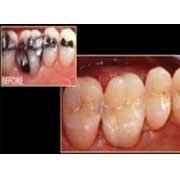If part of a tooth has been lost through decay or damaged due to an accident,
your dentist may put in a dental filling. Dental fillings are used to fill a
portion of tooth or plug the hole and stop anyfuture pain or discomfort.
Types of Dental Fillings
There are two basic types of dental fillings:
Traditional Amalgam Fillings
Composite Resin Tooth-Colored Fillings
Benefits
Nanosized filler particles create a brilliant polish and retention
Gives excellent strength, durability and wear resistance for even the toughest posterior restorations
Can be used for simple to complex restorations involving layering and combining two and opacities
Low polymerization shrinkage for less stress on the tooth and less sensitivity potential for patients
Fluorescence contributes to a more natural looking restoration
Unique nanocomposite-based restorative combines strength and high-quality esthetics
Procedure for Composite Resin Dental Fillings Treatment
The course of treatment described here is one of several options available at our dental clinic.
Consult your dentist to find out what the best solution is for you, given your specific condition
First evaluation and fillings tooth preparation
Decay in tooth is removed and clean cavity of bacteria and debris
Prepare space for the filling
Application of dental fillings
Tooth-colored material is placed in layers
A special light that "cures" or hardens each layer is applied
Shape composite material to the desired result, trim off any excess material
Polish final restoration
Recovery Expectations
Having dental fillings and fillings replacement done is a quick and relatively simple process.
There should be little or no sensitivity in teeth.
Dental fillings treatment can usually be completed within one visit if warranted. If however,
there are a large number of fillings, the visits may be separated for better patient comfort.
Care for Dental Fillings
To maintain your fillings, you should follow good oral hygiene practices:
Floss at least once to twice a day.
Rinse with fluoride rinse before bed. Swish the fluoride rinse vigorously in your mouth for at least one minute. Do not swallow any of the rinse and do not eat or drink anything for 30 minutes
See your dentist for regular professional check-ups and cleanings. If your dentist suspects that a filling might be cracked or is "leaking", further assessment of the situation should be done
If your tooth is extremely sensitive, if you feel a sharp edge, if you notice a crack in the filling, or if a piece of the filling is missing, call your dentist




